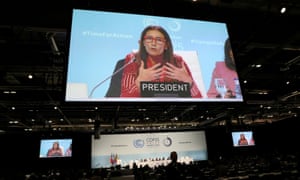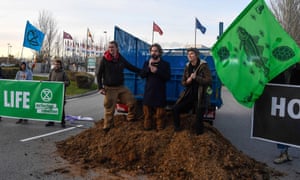Partial agreement at COP25 that countries must be more ambitious to fulfil Paris goals
Climate talks in Madrid have ended with a partial agreement to ask
countries to come up with more ambitious targets to cut greenhouse gas
emissions in order to meet the terms of the 2015 Paris accord.
Few countries came to this year’s talks with updated plans to reach the Paris goals, though the EU finally agreed its long-term target of reaching net zero emissions by 2050. Experts say more ambitious emissions cuts are needed globally if the Paris pledge to hold global heating to no more than 2C is to be met.
This year’s round of annual UN talks focused on narrow technical issues such as the workings of the global carbon markets, a means by which countries can trade their successes in cutting emissions with other countries that have not cut their own emissions fast enough.
By midday on Sunday, more than 40 hours after the talks deadline,
agreement on that was still far off and the issue will have to be
resolved next year.Few countries came to this year’s talks with updated plans to reach the Paris goals, though the EU finally agreed its long-term target of reaching net zero emissions by 2050. Experts say more ambitious emissions cuts are needed globally if the Paris pledge to hold global heating to no more than 2C is to be met.
This year’s round of annual UN talks focused on narrow technical issues such as the workings of the global carbon markets, a means by which countries can trade their successes in cutting emissions with other countries that have not cut their own emissions fast enough.
There were fears that the more substantive issue of future emissions cuts would also be sidelined, but a “high ambition coalition” made up of the EU and many smaller developing countries pressed for a resolution to ask all governments to formulate stronger national plans on cutting carbon.
They partially succeeded, and they will now hope to put political pressure – from within the talks, in behind-the-scenes meetings in world capitals, and in the outside world from civil society – on all governments to recommit to the 2015 Paris accord in 2020 through updates to their national climate plans.
That will be a difficult task, judging by the scenes at the two-week-long Madrid conference.
No major breakthrough had been seriously expected at this year’s meeting, known as COP25, but observers had at least hoped to see a spirit of cooperation and a willingness to press ahead with the Paris agreement goal of holding temperature rises to no more than 2C.

Both were lacking as the talks moved into the early hours of Sunday. Poor countries grew angry at what they saw as intransigence on the part of some richer nations, while the EU and a coalition of developing countries urged others to come forward with more ambitious plans to combat climate breakdown.
In the final hours, weary negotiators wrangled over the wording of provisions for “loss and damage”, by which developing countries are hoping to receive financial assistance for the ravages they face from climate breakdown. The US was blamed for refusing to agree to developing countries’ demands under what is known in the UN jargon as the Warsaw International Mechanism (WIM).
A US state department official said: “The US government is the largest humanitarian donor in the world. The WIM should be a constructive space to catalyse action on the wide range of loss and damage issues. A divisive conversation on blame and liability helps no one.”
Brazil held up agreement over a provision allowing governments to trade in carbon credits. It insisted that its carbon sinks – mainly forests, including the Amazon – should count towards its emissions-cutting goals, while also selling carbon credits derived from preserving forests to other countries to count towards their emissions targets. Other countries said this was double counting and would undermine the carbon trading system.
Governments discussed these points for two weeks with little official attention paid to the broader and more urgent issue of how countries can accelerate their plans to cut carbon in the next decade. Protesters outside and inside the halls pointed to increasingly stark scientific warnings and the world’s failure so far to cut greenhouse gases. Research published during the talks showed that emissions have risen by 4% since the Paris agreement was signed in 2015, and cuts of more than 7% a year will be needed in the next decade to avoid dangerous levels of heating.
The world’s poorest countries, and those most vulnerable to climate chaos, came away largely disappointed and calling for more action in the next year.
Sonam Wangdi, chair of the Least Developed Countries Group, said: “This COP was not able to meet our expectations in raising ambition to address the concerns of our people at home and youth around the world. Now while countries must make transformational improvements to [their emissions reduction] targets by 2020 that put us on a pathway to limit warming to 1.5C.”
Wangdi pointed to the problems already being seen in some of the poorest nations.
“Our people are already suffering from the impacts of climate change. Our communities across the world are being devastated. Global emissions must be drastically and urgently reduced to limit further impacts, and financial support scaled up so our countries can better address climate change and its impacts.”
Jamie Henn, the strategy director at the pressure group 350.org, said: “The level of disconnect between what this COP should have delivered and what it’s on track to deliver is appalling and is a sign that the very foundations of the Paris agreement are being shaken up. A handful of loud countries has hijacked the process and is keeping the rest of the planet hostage.”
Mohamed Adow, the director of Power Shift Africa, a climate and energy thinktank, said: “This is a disastrous, profoundly distressing outcome – the worst I have ever seen. At a time when scientists are queuing up to warn about terrifying consequences if emissions keep rising, and schoolchildren taking to the streets in their millions, what we have here in Madrid is a betrayal of people across the world. It is disgraceful and governments are simply not doing their job of protecting the planet.”
The lack of progress leaves the UK, as a co-host of next year’s talks, with a diplomatic mountain to climb in the next 10 months. In Glasgow early next November, countries will meet again with the aim of strengthening their commitments on emissions cuts under the Paris accord.
Without such reinforcements, current commitments put the world on track for at least 3C of warning, which scientists say would spell disaster.

No comments:
Post a Comment